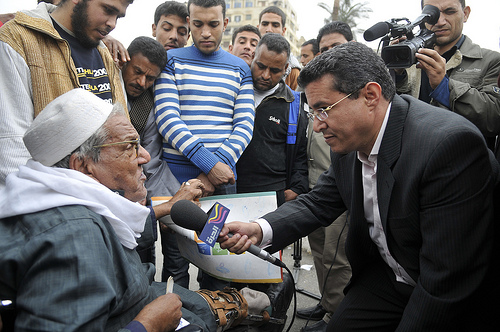Voices from the Field: Tarek Elshamy

Tarek Elshamy reporting from Tahrir Square
“During the dangerous days of covering the 25 January revolution, international journalists were under attack and Alhurra was no exception. A mob stormed Alhurra’s Cairo news office where all our team was camped out reporting on the always changing events minute by minute. It was believed that Mubarak’s regime was trying to stop transmission of TV channels that gained credibility during the revolution. While we were on air a mob tried to storm the office and tried to scare the team. Most of the team climbed out onto the balcony and jumped across to the roof of a hotel that was next door to escape. However, we stayed on the air. I tried to prevent the mob from coming into the offices, but they did get in and went on to steal some equipment and threatened to attack us again if we continued our coverage. However, we were not deterred and continued our nonstop coverage as usual. I also told the story on air to let everyone know that we will not be intimidated.
Alhurra’s coverage of the Egyptian revolution was one of the only places that Egyptian viewers could turn to watch the events as they happened without bias. A phone survey of Egyptians in Cairo and Alexandria showed that 25 percent of the respondents had watched Alhurra during that time as a source of news and information about the revolution.”
Tarek Elshamy is the Cairo News Bureau Chief and Chief Correspondent. He is the host of “Hiwar Cairo,” a weekly program in Cairo, Egypt that examines the political and social aspects of the country on the Alhurra network. The program hosts a wide range of figures, including state ministers, heads of political parties, presidential candidates and others. El Shamy has received awards from the London based Association of International Broadcasting (AIB) as well as the David Burke Award for the distinguished coverage of the Egyptian Revolution.
Leave a comment

